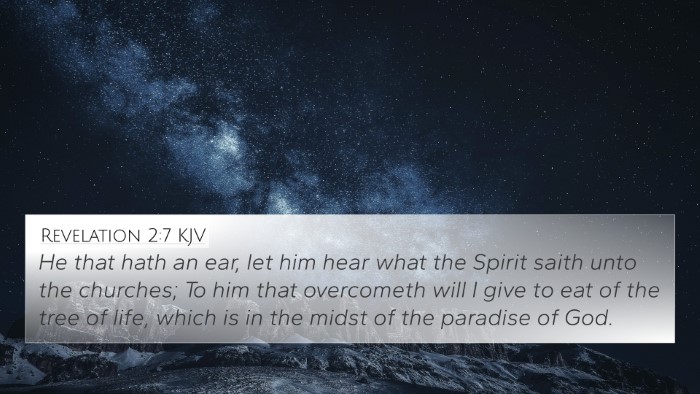Understanding Revelation 3:13
Revelation 3:13 states, "He who has an ear, let him hear what the Spirit says to the churches." This verse serves as a crucial exhortation to the believers of the seven churches addressed in the Book of Revelation, reflecting the broader message of Christ to His church throughout the ages. The emphasis is on the need for spiritual discernment and responsiveness to divine communication.
Key Insights from Public Domain Commentaries
Here we summarize insights from reputable commentaries such as those by Matthew Henry, Albert Barnes, and Adam Clarke.
Matthew Henry's Commentary
Matthew Henry indicates that this verse serves as a divine challenge for believers to be attentive to the messages imparted to their church. He notes that the phrase "He who has an ear" signifies the importance of spiritual awareness, encouraging individuals to actively listen to God's instruction.
Albert Barnes' Notes
Albert Barnes emphasizes that the directive to "hear" reflects the necessity of obedience to God's word. He explains that the Spirit speaks through various means, including scripture, the church, and personal conviction, thus urging readers to remain receptive to the teachings of the Holy Spirit.
Adam Clarke's Commentary
Adam Clarke elaborates on the audience of this message, noting that it was intended for the corporate body of the church. He highlights that this call to hear emphasizes a collective discernment alongside individual responsibility to respond appropriately to God’s voice.
Thematic Connections
Revelation 3:13 has profound connections and thematic parallels with other biblical texts. Below are some key cross-references that illuminate the verse’s deeper meanings and applications:
- John 10:27: "My sheep hear my voice, and I know them, and they follow me." - This verse reinforces the idea of being attuned to Christ's voice.
- James 1:22: "But be doers of the word, and not hearers only, deceiving yourselves." - This stresses the need for action based on hearing.
- Romans 10:17: "So faith comes from hearing, and hearing through the word of Christ." - Emphasizing the importance of hearing the gospel for faith.
- 1 Thessalonians 2:13: "And we also thank God constantly for this, that when you received the word of God, which you heard from us, you accepted it not as the word of men but as what it really is, the word of God." - This highlights the importance of recognizing divine truth in preaching.
- Hebrews 3:15: "As it is said, 'Today, if you hear his voice, do not harden your hearts as in the rebellion.'" - A call to responsiveness and the dangers of ignoring the Spirit's voice.
- Matthew 11:15: "He who has ears to hear, let him hear!" - Similarity in phraseology and the imperative nature of listening to spiritual truth.
- 2 Timothy 4:3: "For the time is coming when people will not endure sound teaching..." - A warning against spiritual apathy and the neglect of God’s word.
Cross-Referencing and Biblical Connectivity
Engaging in cross-referencing Biblical texts enriches our understanding of Revelation 3:13 and underscores its relevance in both the ancient and contemporary church contexts. The act of linking similar Bible scriptures can encourage deeper reflection and insight.
Tools for Bible Cross-Referencing
To explore connections such as these comprehensively, believers can utilize several tools and resources:
- Bible Concordance: An index that helps locate verses by keywords.
- Bible Cross-Reference Guide: These guides outline connections between various scriptures.
- Cross-Reference Bible Study: Engaging in studies focused on understanding how scriptures relate to one another enhances theological insights.
- Comprehensive Bible Cross-Reference Materials: Available in various formats, these resources serve as excellent study aids.
Conclusion
Revelation 3:13 encapsulates a timeless message about the importance of attentiveness to the voice of the Spirit. By recognizing the imperative nature of this scripture and engaging with it through cross-referencing and thematic exploration, believers can cultivate a deeper, more responsive faith. The connections between Bible verses span both Testaments, offering a unified narrative of God's call to His people. Taking heed to these texts encourages a cohesive understanding of Scripture and enriches one's spiritual journey.



